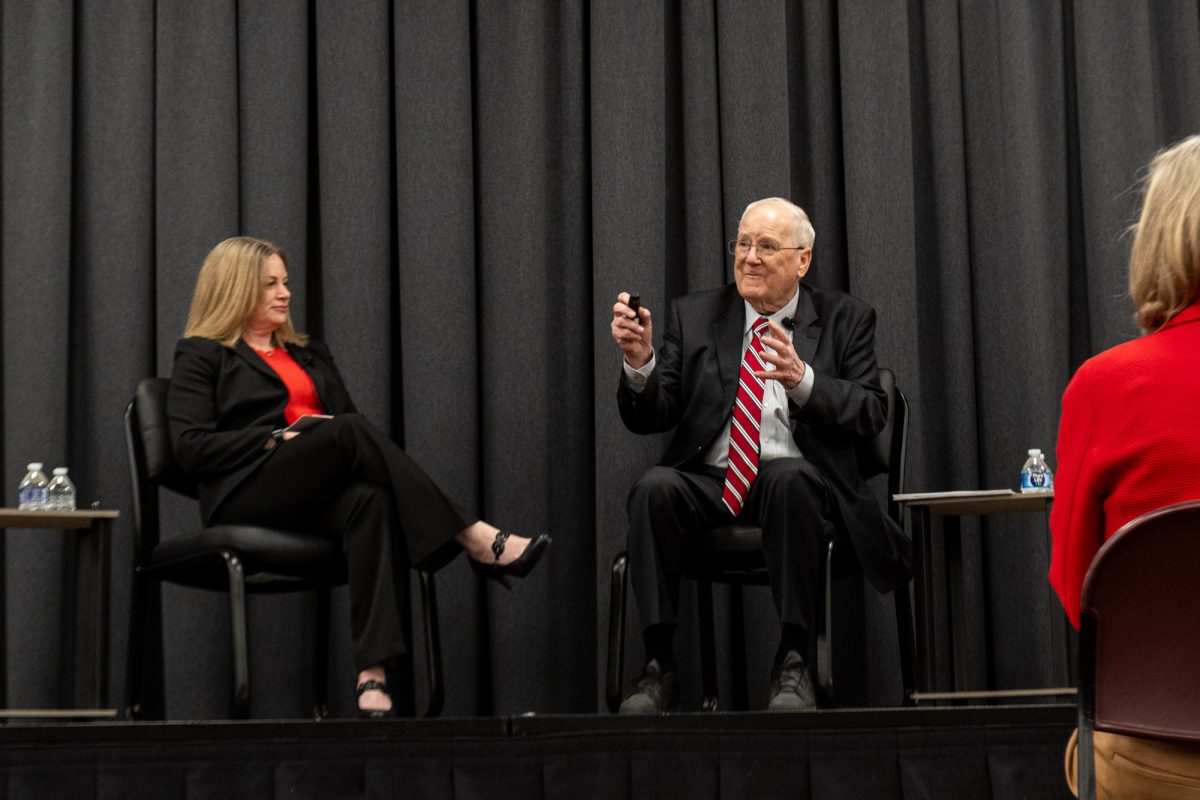Behind the scenes of Ames Community Theater
December 3, 2019
The Ames Community Theater (ACTORS) has a long-standing tradition of providing high quality theatrical performances. This nonprofit has produced plays, musicals and other performances for anyone in the Ames community wanting to laugh, cry or be entertained. ACTORS seats 136 audience members with a full house. This theater is currently on its 64th season, and prides itself on being the third oldest theater in Iowa. But behind all of this success is a long line of volunteers filling roles both on and offstage.
One such contributor is Myra Jackson, the current co-producer for the upcoming production, “Leading Ladies.” The producer position is so time consuming and all-encompassing, ACTORS always assigns two producers per show. “Leading Ladies” will have its ACTORS debut on the last weekend of January, but Jackson and her co-producer began planning in September. Producers are in charge of organizing auditions, scheduling interviews, creating newsletters and programs and much, much more.
“We have to make sure the show’s on time and stays on budget, and that it’s staffed,” Jackson said. “Typically the first thing I do is get our crew together, somebody that does lighting or a sound person, set builder, our house manager. If you look in a program and see the people who work for a show, it’s the producer’s job to line that all up and get them on board. So this show has a tango and a sword fight scene, so we need a choreographer… blissfully, one landed in my lap.”
But producing doesn’t always come so easily. Producers often have to fix difficult problems, even though they might have to be creative to do so.
“There was one show where we had two spotlights,” Jackson said. “One of the spotlights quit the Tuesday of dress rehearsal. And so, guess who ran spotlight for the show? Because if you can’t get somebody to do it, you do it. You have to do what you need to do to have the show be a successful show.”
While producers handle many of the organizational aspects of a production, a director works closely with the cast and crew to prepare the performance aspect.
Bradley Meyer, former director of “Play On!” said, “We cast the show, do the scheduling and we’re in charge of the overall vision of the show — everything that the actors do, say, movement, final approval of all costumes, lighting, sound. You’re the director of everything.”
Directors are very detail-oriented, and do their best to make every performance the best that it can possibly be. By coordinating with all of the different departments and actors, they can ensure one coherent style that remains consistent throughout the show. But, with great power comes the great need to be realistic. Since ACTORS is a nonprofit, they have to stay within budget or risk financial strain or raising the price of tickets.
“If you have a lot of ideas that cost a lot of money, you have to prioritize things,” Meyer said. “So for this show, it might be costumes that are going to be the big thing, so we’ll prioritize that those are going to be really high quality. Then maybe you have to do less for set, or vice versa. If you have really big set requirements, but then have very simple costuming, it’s finding the balance so you can have the vision that you want onstage.”
But the director’s power will only go so far. Myra Jackson does more than just produce. She has also volunteered as the stage manager for “A Christmas Carol.” Stage managers are busy backstage making sure the show runs smoothly by giving time countdowns, reminding actors to grab their props and making sure everyone — lights, sound and actors — hit their cues.
“On opening night, the director’s done — it’s the stage manager’s show,” Jackson said.
The stage manager is also the go-to problem solver. Jackson told a story about one show where the entire sound effect track was deleted right before the curtains were opened. She had to improvise all sound effects with the items she had backstage.
Since it’s the stage manager’s job to essentially be the cast and crew’s mom or dad, it is especially important that they are familiar with the production. Because of this, the stage manager spends a lot of time learning each scene.
“They need to know the play inside and out like the back of their hand,” Jackson said. “They can say the play word for word practically because they’ve been to every rehearsal.”
Volunteers at community theaters typically wear many hats, and Meyer is no exception. For the previous production, “I Love You, You’re Perfect, Now Change,” Meyer worked as a lighting designer. A lighting designer meets with the director and the tech director to coordinate how to program lights for each scene. Meyer compares being a lighting designer to being a computer programmer, where not many people see what goes into making the lights work.
“When we use a computer, we just see everything working, but all of that back-end stuff that you have to do to connect your vision to the board and the programming and the light set up, it can be very difficult.” Meyer said.
It’s important to find a balance between making sure the actors are seen, but not blinded and setting the appropriate mood for the scene. However, some of the biggest challenges for lighting are out of the designer’s control.
“There’s constraints on the amount of things you can do with lighting with the age of the board we have,” Meyer said. “Right now we have some updated lights that have lots of capabilities, but we don’t have a board that is powerful enough to necessarily do all those things. Getting all of those pieces to bring it to the level that’s expected in today’s times are those big expenses.”
Hair and makeup are a large part of creating the characters the audience sees on stage. Megan Kroeger is the hair and makeup designer for upcoming “Leading Ladies.” She stresses the importance of proper hair and makeup styles for stage, and why normal makeup won’t do the job.
“We have to make sure the audience in the way back can see,” Kroeger said. “That’s why you see a lot of people who do theater have a ton of makeup on, because they need to make sure their faces and expressions are visible. The makeup is how that happens.”
In “Leading Ladies,” there is an additional challenge that Kroeger faces. The two main characters are men who are pretending to be women, and the rapid transitions between masculine and feminine styles take a lot of coordination between several departments.
“With the two men who are cross-dressing, it’s how to make them women in a matter of seconds,” Kroeger said. “It’s working with the costume director and orchestrating the quick changes when they have to go from man to woman in a span of 30 seconds, including makeup and hair.”
Even if a production has amazing actors with stylish makeup and coordinated lights, it wouldn’t be complete without sets. Mike Jackson is the husband of Myra Jackson and is also one of the current tech directors for ACTORS. Designing movable walls and large pieces of furniture can be difficult, but he is always looking for volunteers to help paint. While many of the crew members don’t get much attention from the audience, Mike Jackson actually prefers to go unnoticed.
“If [the audience is] focused on the play, the set is doing its job … the rule of thumb is the set is always supposed to complement the play,” Mike Jackson said.
Many would think that Mike Jackson is ideally trained to be a tech designer since he is a professional civil engineer, but he jokes that at times, it’s a hindrance.
“As opposed to building things to last 30 years, it has to last three weeks. But it has to last well for three weeks,” Mike Jackson said.
The driving force behind all the magic would be the ACTORS Board of Directors. Mike Jackson is the board president, Stan Rabe is the vice president of Finance and Operations, Cathy Divine-Koch is the vice president of Membership and Development, Lynn McElrath is the vice president of Play Selection and Artistic Affairs, and Jane Kennedy-Funk is the secretary. Together, they work to keep ACTORS a high-quality, yet sustainable theater. Being a community theater, ACTORS is always looking for ways to involve the local community and Iowa State students.
“We are a completely volunteer organization; no one here is paid,” Mike Jackson said. “On a continual basis, our biggest challenge is having the volunteers available. We don’t have a huge problem getting people to audition for plays and being onstage, but we have to work hard to get people to staff everything behind the scenes and run this business. There’s not a formal agreement with the university but from time to time we have had folks from the university come over. We would love to be a “farm club” for when they want folks to have other experiences, be it set design or lighting or directing.”
ACTORS is currently preparing for two productions. For those looking to get into the Christmas spirit and destress before Dead Week, “ACTORS on the Holidays” will feature the ACTORS jazz band performing Christmas hits alongside readings from David Sedaris’s “Santaland Diaries.” Performances are at 7:30 p.m. Dec. 6 and 7, and at 2 p.m. Dec. 8. Tickets will be $10. The next regular season performance will be “Leading Ladies.” This production will be shown at 7:30 p.m. Jan. 30 and 31, as well as Feb. 1, 7 and 8. There will be a matinee at 2 p.m. Feb. 9. Tickets will be $15.






